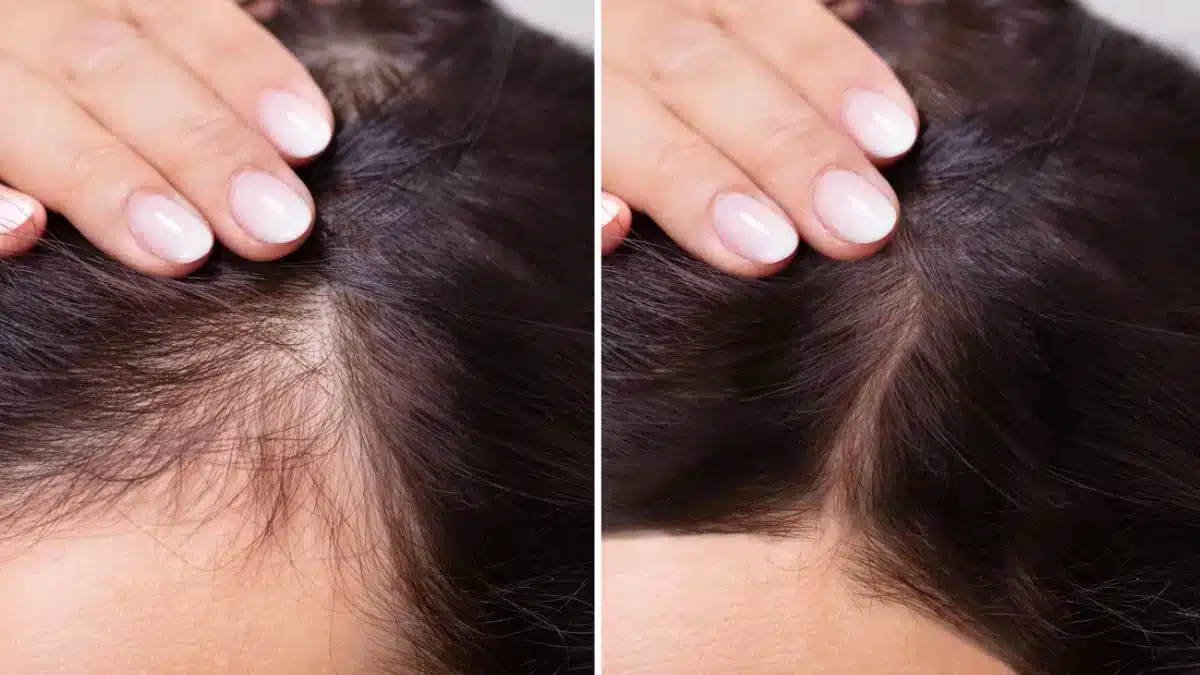How Vitamin D Stopped My Hair Loss: A Key Connection Uncovered
Hair loss can be a distressing and frustrating experience for both men and women.
Finding an effective solution is often a top priority for those who have battled with thinning hair.
Among the various factors contributing to this issue, researchers have recently shed light on the vital role of vitamin D in maintaining healthy hair.
“Vitamin D stopped my hair loss” is a claim that has gained attention among individuals exploring ways to combat hair loss.
In this article, we explore the intriguing link between vitamin D deficiency and hair loss.
We will also discuss how supplementing with this essential nutrient can reverse hair loss and promote regrowth.
Vitamin D’s role in hair growth
Vitamin D plays an important role in various bodily functions, including skin and hair health.
One of its significant contributions lies in stimulating hair follicles, the tiny pores from which new hairs grow.
Adequate vitamin D levels help support the growth and maintenance of hair follicles, preventing premature hair loss.
Vitamin D deficiency and hair loss
Extensive research has indicated that vitamin D deficiency can lead to hair loss and other hair-related issues.
Numerous research studies have provided compelling evidence of the crucial role that vitamin D plays in maintaining healthy hair growth.
Studies have shown a link between vitamin D levels and various types of non-scarring alopecias, such as Androgenetic Alopecia, Alopecia Areata, and Telogen Effluvium.
Additionally, individuals with Alopecia Areata, with patchy hair loss, tend to have significantly lower levels of vitamin D than without the condition.
This finding suggests that maintaining adequate vitamin D levels could play a pivotal role in mitigating the effects of Alopecia Areata and potentially promoting hair regrowth.
Vitamin D’s potential as a hair loss treatment

Vitamin D has been the subject of interest concerning hair loss treatment due to its potential role in promoting hair regrowth.
Scientific research on this topic is ongoing and specific results may vary from person to person.
However, compelling observations have suggested that vitamin D supplementation could positively affect hair health.
One area of focus has been on individuals experiencing patterned hair loss, a common condition characterized by gradual hair thinning, particularly in some regions of the scalp.
In some cases, individuals diagnosed with severe vitamin D deficiency have shown improvement in their hair regrowth after starting a course of vitamin D3 supplements.
Vitamin D regulates hair follicle cycling and may positively influence the hair growth cycle.
Treatment of hair loss using Vitamin D
Vitamin D is vital in maintaining healthy hair follicles and promoting hair growth.
The receptors are present in hair follicles, and their deficiency has been linked to hair thinning and even hair loss in some cases.
Therefore, using Vitamin D as a treatment for hair loss focuses on ensuring adequate levels of this vitamin in the body.
Here’s how Vitamin D is used as a treatment for hair loss:
Vitamin D supplements
If the blood tests reveal a Vitamin D deficiency, the most common treatment is Vitamin D supplements.
The supplements come in various forms, such as capsules or tablets, and may be taken daily, weekly, or monthly.
Dosage
The dosage of Vitamin D supplements will depend on the individual’s age and the severity of the deficiency.
The Endocrine Society recommends different daily dosages for other age groups, with adults generally advised to take between 600 and 800 IU of Vitamin D per day.
Optimizing vitamin D absorption
Vitamin D supplements should be eaten with meals, especially those containing ample healthful fats.
The presence of dietary fat enhances the absorption of vitamin D within the body, maximizing its effectiveness.
Excellent sources of dietary fats that can aid vitamin D absorption include avocado, eggs, chia seeds, fatty fish, nuts, and cheese.
Monitoring
When using Vitamin D supplements as a treatment for hair loss, it is essential to monitor Vitamin D levels through blood tests regularly.
This helps to ensure that the deficiency is adequately addressed and adjustments to the dosage can be made if necessary.
Prevention of hair loss

Taking proactive measures can help prevent further hair loss and promote healthy growth.
To maximize the effectiveness of Vitamin D for preventing hair loss, you can use the following methods:
- Ensure adequate vitamin D intake by spending 15 to 20 minutes outside per day
- Consume foods rich with vitamin D, such as fatty fish, egg yolks, fortified dairy products, and fortified cereals.
- Consider a vitamin D supplement if necessary
- Avoid pulling hair when brushing; use a wide-toothed comb or soft bristle brush
- Avoid tight hairstyles like ponytails and braids that put stress on the hair
- Use a gentle and natural conditioner free from harsh chemicals and sulfates
- Put long hair in a loose braid before bed to prevent tangling and minimize friction on the pillow
Conclusion
Vitamin D is vital in stimulating hair follicles and promoting healthy hair growth.
Several studies have demonstrated the inverse relationship between vitamin D levels and various hair loss conditions, emphasizing its importance in maintaining hair health.
Incorporating vitamin D supplements as part of a comprehensive treatment plan may help improve hair regrowth for individuals with a confirmed vitamin D deficiency.
Prevention is equally crucial in maintaining healthy hair and minimizing hair loss.
If necessary, ensuring sufficient vitamin D intake through sunlight exposure, diet, and supplements can support overall hair health.
Adopting gentle hair care practices, such as using a wide-toothed comb, avoiding tight hairstyles, and using natural conditioners, can help prevent further hair breakage and damage.
In conclusion, a proactive approach to hair health, including addressing vitamin D levels, can significantly contribute to maintaining vibrant and healthy hair.
Frequently Asked Questions
WowRx uses only high-quality sources while writing our articles. Please read our content information policy to know more about how we keep our content reliable and trustworthy.






